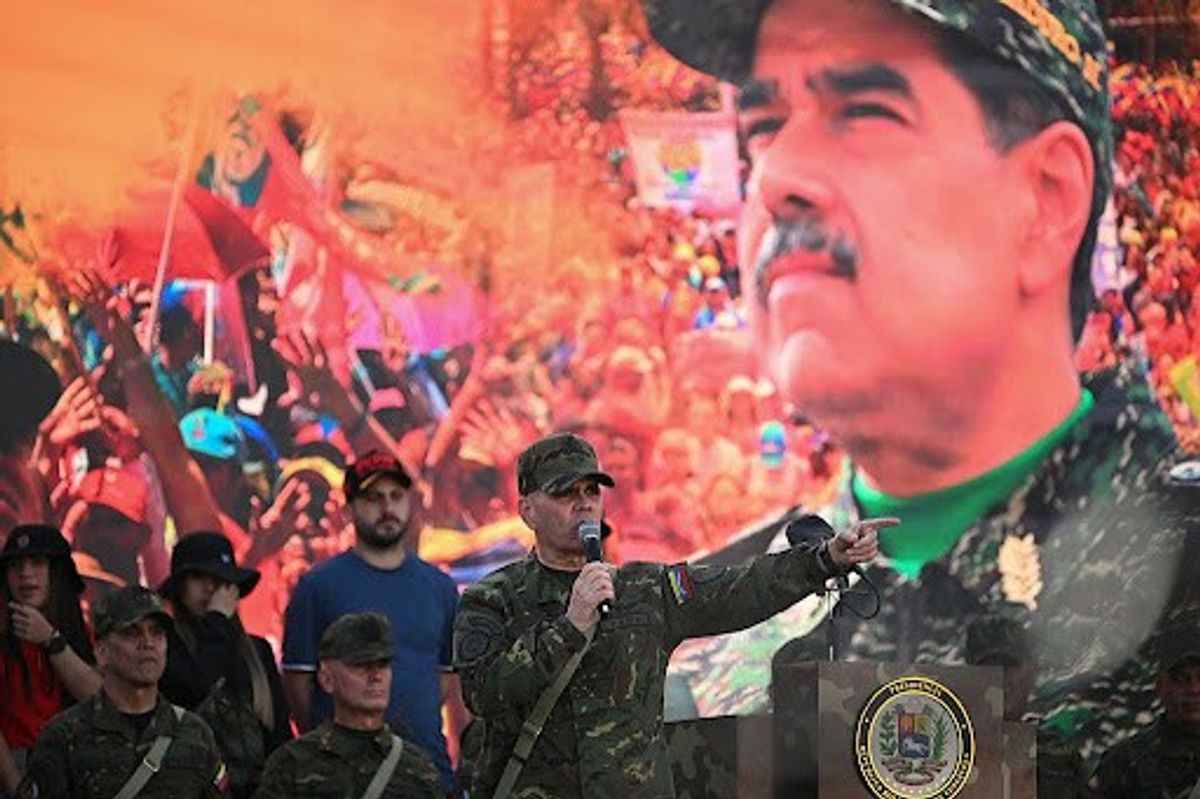EXPERT INTERVIEW — The Trump administration is prioritizing going after Mexican drug cartels as a key national security objective. It has designated the cartels as foreign terrorist organizations, and the first U.S. intelligence community threat assessment of the second Trump administration ranked the cartels as a top national security risk.
The Cipher Brief spoke with Ray Donovan, former chief of operations at the Drug Enforcement Administration (DEA), to understand what the designation means in the fight against the cartels, how the threat from the cartels has changed with the increase in fentanyl trafficking, and how China and technology factor into the cartels’ activities.
“What we have here is a unique time, a unique opportunity to present a whole-of-government approach to going after these groups that have for so long wreaked havoc across America, victimizing towns, communities, cities, and trafficking,” Donovan said.
Donovan spoke with Cipher Brief Contributing Editor Elaine Shannon. Their conversation has been edited for length and clarity. You can also watch the full discussion on The Cipher Brief YouTube channel, and read more about CIA and U.S. military operations against the cartels in The Cipher Brief.
The Cipher Brief: The Trump administration and the intelligence community have for the first time made the cartels in Mexico the number one national security threat to the U.S. What does that mean and what will change, if anything?
Donovan: It changes a lot. Prior to that moment, the Mexican cartels were primarily criminal organizations. So it means that law enforcement was focused on them to the degree that we can go after them. It was never really a high national security priority for the United States until the designation of those cartels becoming foreign terrorist organizations — that completely elevates their status. It crosses over many government entities across the board, not just law enforcement such as DEA, FBI, etc., but it goes into DoD space and into Intel space. So what we have here is a unique time, a unique opportunity to present a whole-of-government approach to going after these groups that have for so long wreaked havoc across America, victimizing towns, communities, cities, and trafficking. Large amounts of synthetic drugs such as methamphetamine and fentanyl, but historically things such as cocaine, heroin, marijuana, with so many people directly being impacted across America. This was the breakpoint. This was the moment in time the Trump administration basically said, enough is enough.
The Cipher Brief: They’re also trafficking migrants. Some tell me that they're even making more money shaking down migrants, threatening them, or charging them fees for transportation than they are for some drugs. I don't think a lot of people realize how big these cartels are. Can you tell us a little bit about that?
Donovan: These cartels are massive. They’re not just here in the United States. For example, the Sinaloa cartel is in 65 countries worldwide. I mean, CJNG (Jalisco New Generation Cartel) has tentacles all over the world, and we've seen that from West Africa to all over Europe to Asia, clearly in the Western hemisphere — they have got global reach. They're not only involved with drug trafficking. As you mentioned, they're involved in other transnational crime — sex trafficking, human trafficking, oil theft, kidnapping, extortion. You can go on and on and on.
The Cipher Brief: They're also deeply ingrained in parts of the government of Mexico, which has been one of the problems, hasn't it?
Donovan: It has been. One of the issues in Mexico, historically speaking, has been that to be able to challenge the cartels meant in some cases challenging the establishment behind the cartels. That means the corrupt politicians and officials that support and, in many cases, are the backbone to the cartels at the local level, the state level, and even the national level. And so I think that the [U.S.] designation also puts a tremendous focus on that — on who's behind the cartels, who's allowed them to thrive for so many years. And this designation and the laws behind it now are incredibly important for our ability as a nation in the United States to really hold them accountable.
Experts are gathering at The Cipher Brief’s NatSecEDGE conference June 5-6 in Austin, TX to talk about the future of war. Be a part of the conversation.
The Cipher Brief: Back in the day, DEA, and to some extent the FBI were often butting heads with the intelligence community in Mexico and a few other places, because the intelligence community has a historically different message and mission. Do you think that all of these agencies can work together with one mission for a change?
Donovan: I think we don't have a choice. This is much bigger than one agency's mission. It really is about national security. From 2015 to 2024, over 500,000 Americans have succumbed to overdose deaths and poisonings. The line has been drawn, whether it's China as it relates to transnational crime or intelligence operations coming into the Western hemisphere or it's Mexican corruption and cartels. It's time for us to hold that line. And I think that's what this message is more about. We can't have Americans dying without any response. This is the response.
The Cipher Brief: Let’s talk about China for a moment — the alliance between the Mexican cartels and China. Can you explain that to us?
Donovan: That alliance between the Mexican cartels in China goes back many, many decades. It goes back into the late 1980s, 1990s, when we first started seeing methamphetamine flow into the United States, coming from Mexico. The precursor chemicals are produced and exported from China into Mexico. So we know that there's a longstanding relationship between the chemical industry and the Mexican cartels who are behind the chemical industry. In many cases, it's the PRC (People’s Republic of China) and the CCP (Chinese Communist Party). We know that based on my testimony last year before Congress in April, where we openly said that we have many Chinese companies that are subsidized by the Chinese government or are owned directly by the Chinese government are also producing illicit chemicals, including fentanyl and fentanyl derivatives, that are being shipped to Mexico or directly to the United States from China. So we know there's a longstanding relationship that goes back to when methamphetamine first started to be produced in Mexico.
From that, those relationships got stronger and stronger over time until they introduced fentanyl into the market around 2012. Once fentanyl was introduced to make heroin stronger, they then had two streams of chemicals flowing into Mexico — one for meth production, the other for fentanyl production, now hitting markets in the United States.
It was incredibly challenging for us in law enforcement to get after that problem, especially when you have a global drug trade that is now synthetic. It’s not dependent on the weather or crops or water streams, hiding and building, clandestine labs in the mountains of Chihuahua or Durango or Sinaloa. Now you have synthetic labs that are in the cities, in industrial areas that are mass producing millions upon millions of fentanyl pills and pounds of methamphetamine.
The Cipher Brief: There's another issue too, with China, and that's the money laundering. Many times the [cartel leaders] want to buy an apartment building in Los Angeles or New York, and they need a sophisticated system to get the money clean and get it into real estate or stock or whatever they want to do. How does that work?
Donovan: That's a really intricate system of money laundering. By and large, it's done through trade-based money laundering, meaning the Chinese organized criminal groups that are based in Mexico will collaborate directly across the aisle with Mexican cartels, and they'll get contracts to move that money, meaning have that money picked up in the United States. Eventually that money is utilized to buy American goods. The American goods are shipped to China where they're sold for 200-300% markup to recoup money and investment. And they manufacture goods that are then shipped to Mexico. That's just one methodology, many nuances within it.
So you now have the Chinese criminal groups that are on the top of the drug trade, meaning that they're providing their precursor chemicals for production. They're also at the bottom of the drug trade, also laundering billions of dollars in drug proceeds. And so that has been the change, not only because of synthetics and chemicals coming into illicit drug market, but also technology - the ability to communicate on end-to-end encrypted applications, the globalization of technology through digital currency. We've seen criminal groups really expand their operations because of that. The world's gotten a lot smaller, and so criminal groups have a lot more reach. That’s the interconnectivity between China, Mexico, and United States.
The Cipher Brief: Let’s talk about the risk of American banks, international banks. Reputable banks are at great risk, particularly because of the designation of the cartels as terrorists. Now, the American law makes it much easier to charge them too, if they are sloppy, and take people's money.
Donovan: Yes, it does. So obviously the designation [of cartels as] foreign terrorist organization elevates the risk to banking institutions, not only in the United States, but throughout the world. Any connectivity to Mexican cartels is connectivity to a foreign terrorist group. But it's not only limited to the banking institutions — it's any company that does logistics between Mexico and the United States. It could be international companies that cross both sides of the border. Express mail service providers, there are different areas that cross into the cartel. Sometimes it's knowing, sometimes it's unknown, but they have a responsibility to due diligence and ensure that their companies are not connected to the cartel in any way, shape or form, because what's the outcome? The outcome is they have a lot of risk and a lot of exposure. And so this designation also changes their operations as well.
The Cipher Brief is committed to publishing a range of perspectives on national security issues submitted by deeply experienced national security professionals.
Opinions expressed are those of the author and do not represent the views or opinions of The Cipher Brief.
Have a perspective to share based on your experience in the national security field? Send it to Editor@thecipherbrief.com for publication consideration.
Read more expert-driven national security insights, perspective and analysis in The Cipher Brief











